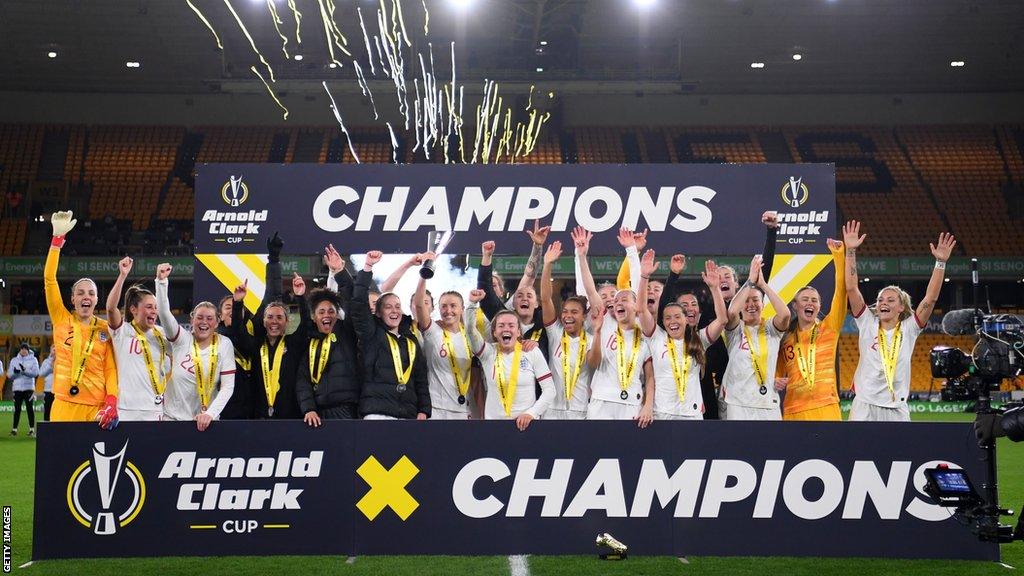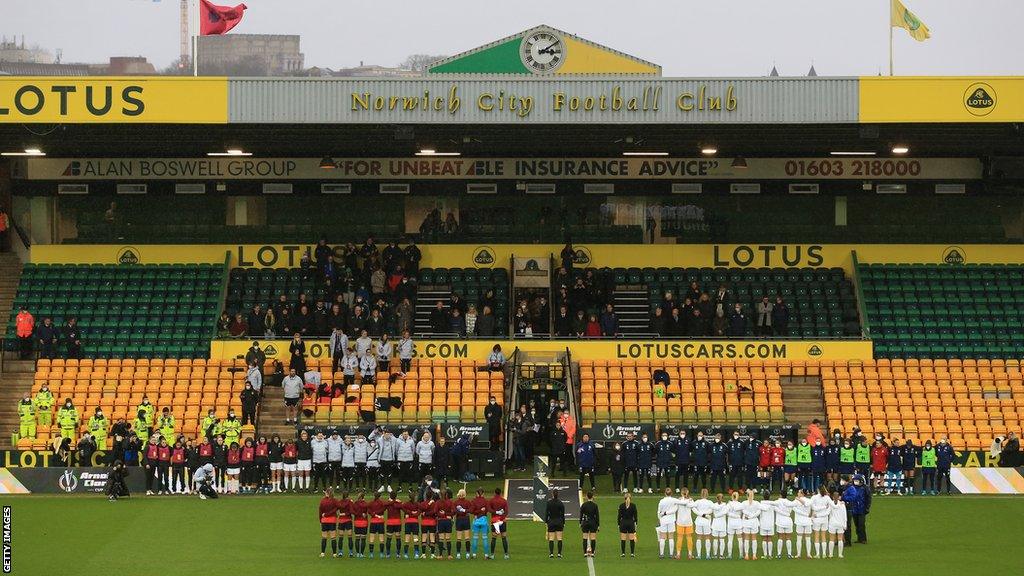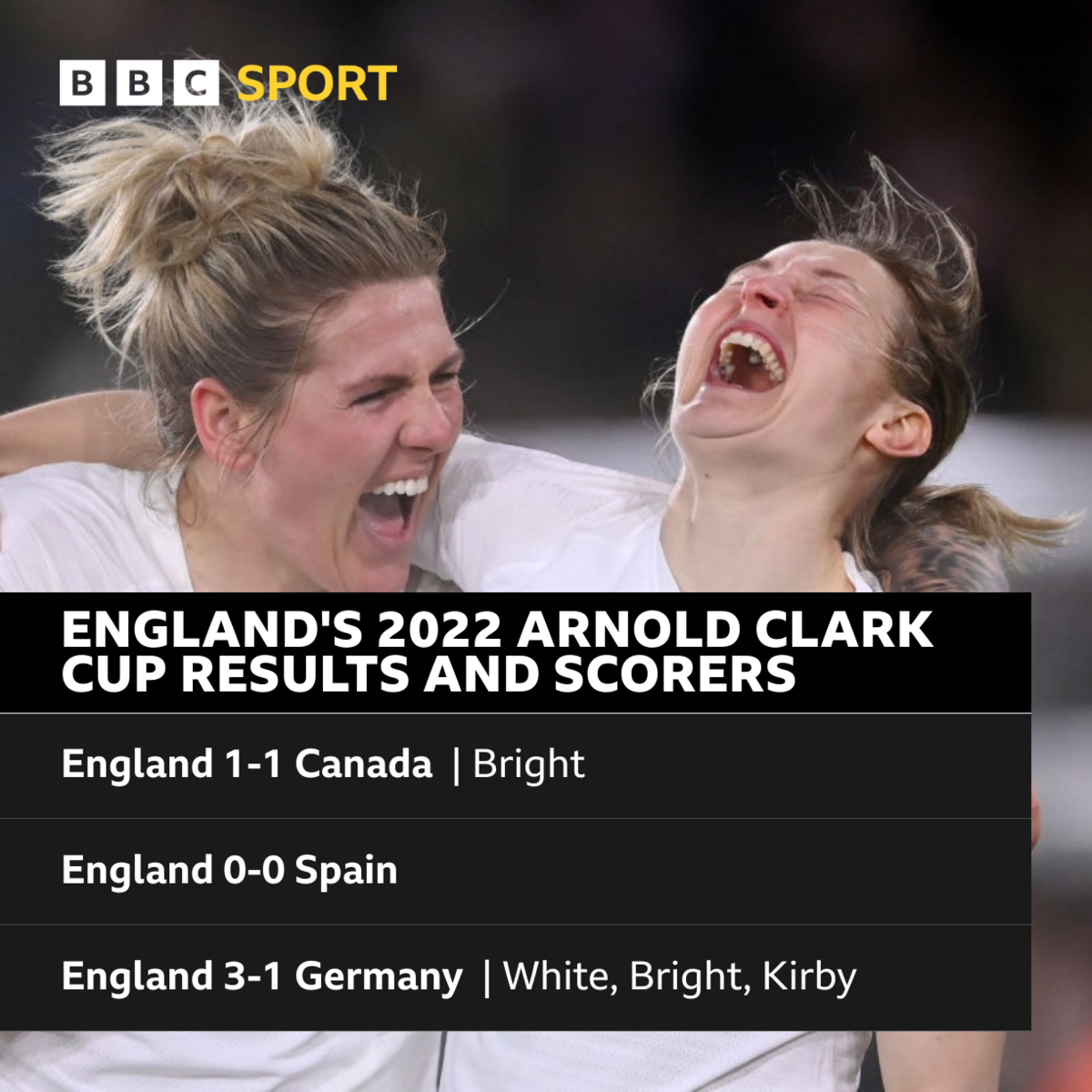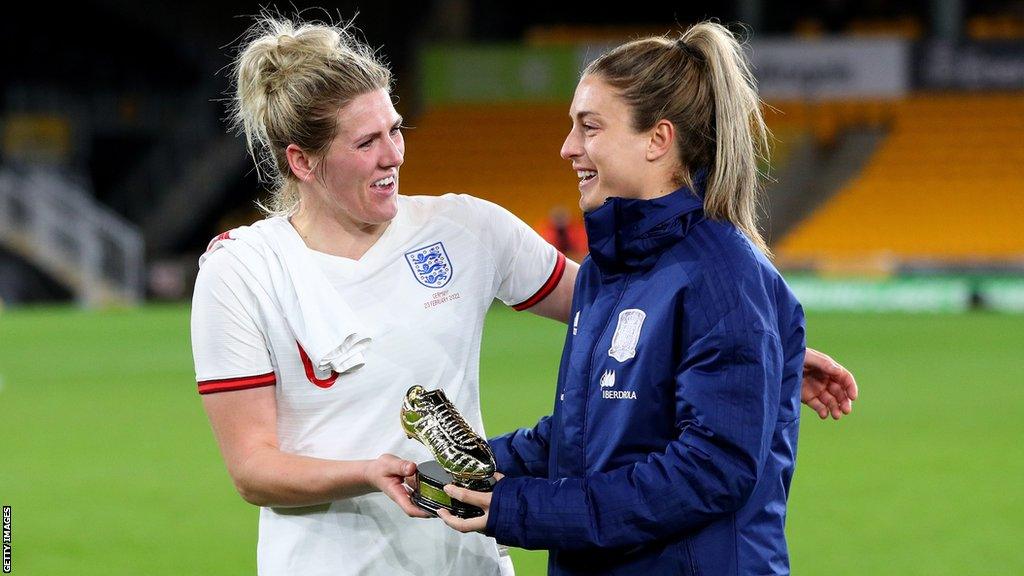Arnold Clark Cup 2023: England host tournament featuring South Korea, Italy and Belgium
- Published

England were inaugural Arnold Clark Cup champions in 2022
Having claimed a historic first Euros title last year, England begin their preparations to take on the world whey they host this month's Arnold Clark Cup for the second time.
Last year's inaugural tournament was won by the Lionesses, and this year will serve as valuable preparation for summer's 2023 Women's World Cup in Australia and New Zealand.
The home competition begins on Thursday, 16 February, and England manager Sarina Wiegman has described it as "perfect preparation" for their World Cup campaign. Here's what to expect.
What is the Arnold Clark Cup?
The four-team, round-robin international tournament sees each side play each other once. The team top of the table after three matches are crowned champions.
The cup is one of several mini-tournaments in the women's international football calendar, with England now hosting their own rather than taking part in the annual SheBelieves Cup, hosted by the United States.
Who is taking part?
The 2022 edition featured Germany, Canada, England and Spain, who were third, sixth, eighth and ninth respectively in the Fifa world rankings.
England and Barcelona midfielder Keira Walsh breaks down her game in masterclass
This year the Lionesses - up to fourth in the world as of December 2022 - will start clear favourites against 15th-ranked South Korea, world number 17 Italy, and Belgium, who are 20th.
For South Korea and Italy, it will also serve as preparation for this summer's World Cup, which starts on 20 July. Belgium, who beat Italy 1-0 to reach the Euro 2022 quarter-finals, failed to qualify.
Despite the lower quality of England's opponents this time, Wiegman insists the variety of opposition will be very useful for her side in getting ready for the summer.
"Everything we do now is about being ready for the World Cup," she said. "It's great to have the opportunity to defend this title in front of our fans.
"Facing three different, good oppositions - each with a different style of play - and playing three matches in seven days is the perfect preparation for the challenges that await us in the summer."
Where will the games be played?

The 2022 edition attracted low crowds for games not involving England
European champions England will open the tournament against South Korea on 16 February at Stadium MK in Milton Keynes, before facing Italy on 19 February at Coventry's CBS Arena, and finally playing Belgium on 22 February at Bristol City's Ashton Gate.
All fixtures will be double-headers, in a bid to boost crowds by offering two matches for ticket-holders - although this tactic was unsuccessful last year.
Those six matches, which were held at Wolves' Molineux, Norwich's Carrow Road and Middlesbrough's Riverside Stadium, attracted an average crowd of just 6,300. That figure is skewed somewhat, too - England were the only nation who had a crowd of more than 1,000 at all their games.
There were just 249 fans at the 2022 opening game between Germany and Spain at the Riverside - albeit the game took place during Storm Eunice - while after a tournament-high 14,284 turned out to watch England draw 0-0 with Spain at Carrow Road, a meagre 119 fans stayed for Canada 1-0 Germany which followed.
Fears this would be a precursor to low crowds at the Euros turned out to be unfounded. However the Football Association will hope for a better turnout if the competition is to survive.
Full schedule (all kick-off times GMT)
Thursday, 16 February
Italy v Belgium, Stadium MK, 16:45
England v South Korea, Stadium MK, 19:45
Sunday, 19 February
England v Italy, Coventry Building Society Arena, 15:15
Belgium v South Korea, Coventry Building Society Arena, 18:15
Wednesday, 22 February
South Korea v Italy, Ashton Gate, 16:45
England v Belgium, Ashton Gate, 19:45
What happened last year?

In what turned out to be a foreshadowing of the Euros, England won the trophy on goal difference after beating Germany 3-1 in the final match of the competition at Molineux.
Low scores throughout the competition - which also featured three draws in six matches - meant that victory was the only time a side scored more than once in a match.
Lionesses centre-back Millie Bright shared the top-scorer prize with Spain's Ballon d'Or holder Alexia Putellas, with each scoring two goals.

An unlikely joint-top scorer award for England defender Millie Bright

'I hated his comedy': Steve Coogan chats to Nihal Arthanayake about British humour and cancel culture
The rise and fall of the jeweller-turned-criminal: Listen to Gangster: The Story of John Palmer
